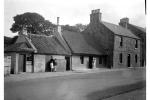Foulis: 300 years ago...
May - June

© Royal Commission on the Ancient and Historical Monuments of Scotland. Licensor www.scran.ac.uk
A thatched cottage in Juniper Green
Sir John Foulis's account books for May remind us what life was like before our convenience age. In May 1702 he had a brew house built at Woodhall and equipped with cauldron and kettle so he could brew his own beer. He then sent one of his servants to seek "thack" to roof it (and his hay house and wash house for good measure). At the same time he had hogsheads of wine brought up from Leith, paid out for bottles and corks and then had racks built to hold them.
He was a generous man giving to Colinton's Poor Box, during and after Communion Sundays, a little like today's practice at Juniper Green Parish Church's quarterly donations into "birthday boxes". But, less formally, he gave two pounds and eighteen shillings for music and jollifications at a penny wedding of his tenant, William Denham's, "herd" or worker. A further seven shillings were given to the paper mill men for drink (with five shillings for a corkscrew to access it!). Other servants were regularly bought shoes as part of their wages with their likes and dislikes - for a low heel or a wooden one - noted in the accounts.
May seems to have been a sickly month for Woodhall. In May 1707 Sir John made his last entries in his accounts, irritably paying two shillings for Robert Wilson to shoot the "huddit" crows and David Zets another two shillings for taking down the pyot (magpie) nests which were disturbing his sick bed. Three years earlier to the month his daughter-in-law had died and the accounts then recorded his mourning with the blacking of his buckles, the buying of black hats and suits of clothes for himself and his servants, and rather gruesomely, white gloves for the corpse.
Every June Sir John Foulis set his tenants to some seriously heavy work. There was the Woodhall coal cellar to fill, with loads carted from East Lothian, Loanhead or up from Leith Harbour. Sometimes, June saw them carting lime and stone to build walls round the orchard and down to the Water of Leith, and then divots of turf to cap them. Perhaps there were summer discounts on coal and builders' supplies then but more likely the summer months made carting on the local roads and tracks easier. With no tarmac and only a few stones to fill the worst potholes carting heavy loads in winter months was an impossibly slow and muddy process. Making your tenants do it as part of their rent was the way of life for a country gentleman.
Where there were no roads, sleds would be rigged up to bump behind a pony: James Johnston's wife was paid nearly two pounds for fifteen sleds of whin cut and delivered from the Curriemuir while another woman was paid four shillings for making up twelve broom besoms from them.
Other jobs may have been more congenial like taking the cow to the bull in Swanston to ensure the winter's supply of milk, washing the sheep and clipping them and even letting out the mill dam on the Water of Leith and netting the trout in it.
Sir John, meanwhile, continued his convivial life with mutchkins of wine (a covered jugful of about three pints) from the Rhine for fourteen shillings, from Nantes for eight shillings (but that needed sugar to make it palatable) as well as Claret from Bordeaux and a bottle from Barcelona. He was clearly a good customer of the wine merchants of Leith, but more cautious about the new fashions. Two shillings and sixpence was quite enough for two dishes of "tee".
Selected from entries for May and June in Sir John Foulis's Account Books.
